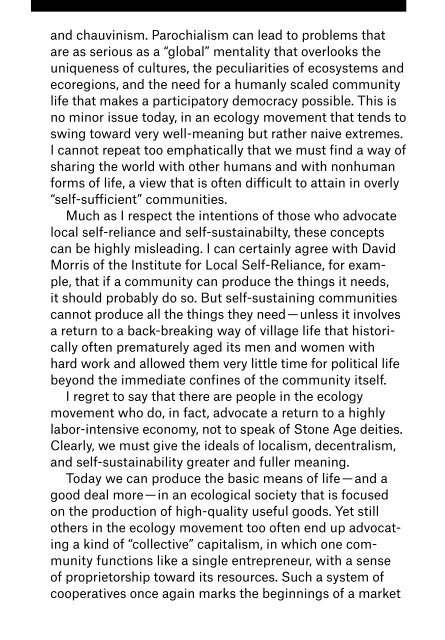Stateless Democracy
NWA5-Stateless-Democracy1.pdf?utm_content=buffer7beda&utm_medium=social&utm_source=twitter
NWA5-Stateless-Democracy1.pdf?utm_content=buffer7beda&utm_medium=social&utm_source=twitter
You also want an ePaper? Increase the reach of your titles
YUMPU automatically turns print PDFs into web optimized ePapers that Google loves.
and chauvinism. Parochialism can lead to problems that<br />
are as serious as a “global” mentality that overlooks the<br />
uniqueness of cultures, the peculiarities of ecosystems and<br />
ecoregions, and the need for a humanly scaled community<br />
life that makes a participatory democracy possible. This is<br />
no minor issue today, in an ecology movement that tends to<br />
swing toward very well-meaning but rather naive extremes.<br />
I cannot repeat too emphatically that we must find a way of<br />
sharing the world with other humans and with nonhuman<br />
forms of life, a view that is often difficult to attain in overly<br />
“self-sufficient” communities.<br />
Much as I respect the intentions of those who advocate<br />
local self-reliance and self-sustainabilty, these concepts<br />
can be highly misleading. I can certainly agree with David<br />
Morris of the Institute for Local Self-Reliance, for example,<br />
that if a community can produce the things it needs,<br />
it should probably do so. But self-sustaining communities<br />
cannot produce all the things they need — unless it involves<br />
a return to a back-breaking way of village life that historically<br />
often prematurely aged its men and women with<br />
hard work and allowed them very little time for political life<br />
beyond the immediate confines of the community itself.<br />
I regret to say that there are people in the ecology<br />
movement who do, in fact, advocate a return to a highly<br />
labor-intensive economy, not to speak of Stone Age deities.<br />
Clearly, we must give the ideals of localism, decentralism,<br />
and self-sustainability greater and fuller meaning.<br />
Today we can produce the basic means of life — and a<br />
good deal more — in an ecological society that is focused<br />
on the production of high-quality useful goods. Yet still<br />
others in the ecology movement too often end up advocating<br />
a kind of “collective” capitalism, in which one community<br />
functions like a single entrepreneur, with a sense<br />
of proprietorship toward its resources. Such a system of<br />
cooperatives once again marks the beginnings of a market<br />
system of distribution, as cooperatives become entangled<br />
in the web of “bourgeois rights” — that is, in contracts and<br />
bookkeeping that focus on the exact amounts a community<br />
will receive in “exchange” for what it delivers to others. This<br />
deterioration occurred among some of the worker-controlled<br />
enterprises that functioned like capitalistic enterprises<br />
in Barcelona after the workers expropriated them<br />
in July 1936 — a practice that the anarcho-syndicalist CNT<br />
fought early in the Spanish Revolution.<br />
It is a troubling fact that neither decentralization nor<br />
self-sufficiency in itself is necessarily democratic. Plato’s<br />
ideal city in the Republic was indeed designed to be selfsufficient,<br />
but its self-sufficiency was meant to maintain a<br />
warrior as well as a philosophical elite. Indeed, its capacity<br />
to preserve its self-sufficiency depended upon its ability,<br />
like Sparta, to resist the seemingly “corruptive” influence<br />
of outside cultures (a characteristic, I may say, that still<br />
appears in many closed societies in the East). Similarly,<br />
decentralization in itself provides no assurance that we<br />
will have an ecological society. A decentralized society<br />
can easily co-exist with extremely rigid hierarchies. A<br />
striking example is European and Oriental feudalism, a<br />
social order in which princely, ducal, and baronial hierarchies<br />
were based on highly decentralized communities.<br />
With all due respect to Fritz Schumacher, small is not<br />
necessarily beautiful.<br />
Nor does it follow that humanly scaled communities<br />
and “appropriate technologies” in themselves constitute<br />
guarantees against domineering societies. In fact, for<br />
centuries humanity lived in villages and small towns, often<br />
with tightly organized social ties and even communistic<br />
forms of property. But these provided the material basis for<br />
highly despotic imperial states. Considered on economic<br />
and property terms, they might earn a high place in the<br />
“no-growth” outlook of economists like Herman Daly, but<br />
118–119


